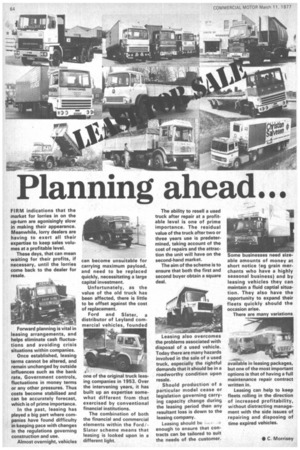Planning ahead...
Page 68

If you've noticed an error in this article please click here to report it so we can fix it.
FIRM indications that the market for lorries in on the up-turn are agonisingly slow in making their appearance. Meanwhile, lorry dealers are having to exert all their expertise to keep sales volumes at a profitable level.
These days, that can mean waiting for their profits, if necessary, until the lorries come back to the dealer for resale.
Forward planning is vital in leasing arrangements, and helps eliminate cash fluctuations and avoiding crisis situations within companies.
Once established, leasing terms cannot be altered, and remain unchanged by outside influences such as the bank rate, Government controls, fluctuations in money terms or any other pressures. Thus costs become stabilised and can be accurately forecast, which is of prime importance.
In the past, leasing has played a big part where companies have found difficulty in keeping pace with changes in the regulations governing construction and use.
Almost overnight, vehicles can become unsuitable for carrying maximum payload, and need to be replaced quickly, necessitating a large capital investment.
Unfortunately, as the value of the old truck has been affected, there is little to be offset against the cost of replacement.
Ford and Slater, a distributor of Leyland commercial vehicles, founded one of the original truck leasing companies in 1953. Over the intervening years, it has built up an expertise somewhat different from that exercised by conventional financial institutions.
The combination of both the financial and commercial elements within the Ford/Slater scheme means that leasing is looked upon in a different light. The ability to resell a used truck after repair at a profitable level is one of prime importance. The residual value of the truck after two or three years use is predetermined, taking account of the cost of repairs and the attraction the unit will have on the second-hand market.
The aim of the scheme is to ensure that both the first and second buyer obtain a square deal.
Leasing also overcomes the problems associated with disposal of a used vehicle. Today there are many hazards involved in the sale of a used truck, especially the rightful demands that it should be in a roadworthy condition upon resale.
Should production of a particular model cease or legislation governing carrying capacity change during the leasing period then any resultant loss is down to the leasing company.
Leasing should be enough to ensure that contracts can be tailored to suit the needs of the customer. Some businesses need sizeable amounts of money at short notice (eg grain merchants who have a highly seasonal business) and by leasing vehicles they can maintain a fluid captial situation. They also have the opportunity to expand their fleets quickly should the occasion arise.
There are many variations available in leasing packages, but one of the most important options is that of having a full maintenance repair contract written in.
Leasing can help to keep fleets rolling in the direction of increased profitability, without distracting management with the side issues of, repairing and disposing of time expired vehicles.
• C. Morrisey






















































































































